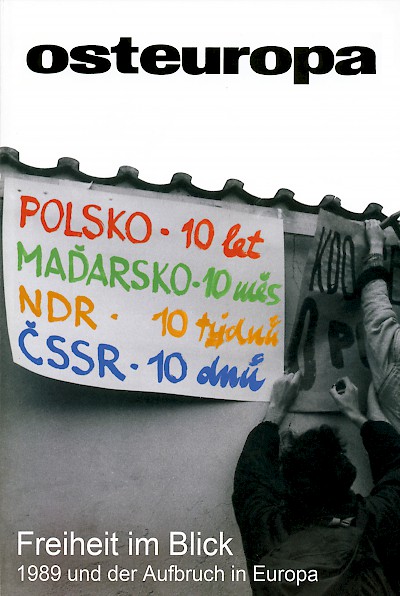Freedom in Sight
1989 and Europe’s New Start
Osteuropa 2-3/2009
Manfred Sapper, Volker Weichsel (Ed.)
Berlin (BWV) 2009 [= Osteuropa 2-3/2009]
400 pages, 50 figures
Price: 24,00 €
ISBN: 978-3-8305-1604-0
Print vergriffen
Deutsche Fassung
Contents
- Editorial
1989 and the Spirit of the Time - Adam Michnik
In Defence of Freedom
Reflections on 1989 - György Konrád
Without Beatings and Gunfire
Notes from the Turning Point: December ‘88–January ‘89 - Petr Pithart
Birth Mark
How the “Velvet Revolution” Degenerated into a “Regime Change” - Tomas Venclova
Those Who Lived in the Cold
The Lithuanian Dissidence 1953–1980 History
- Karl Schlögel
The “Merchant Ants” of Zoo Station
On History on the Sidelines and Forgotten Europeans - Wolfgang Eichwede
Don Quixote’s Victory The Civil Rights Activists and the
The Civil Rights Activists and the Revolutions of 1989 - Oldřich Tůma
When the Shadow Disappeared
The Collapse of the Czechoslovak Regime in Comparison - Andrzej Paczkowski
The Polish Civil War
The Unrelenting Decline of Communism - Gerhard Simon
History’s Cunning
Perestroika, the Fall of the Berlin Wall, and the end of the Soviet Union - Fedor Luk’janov
Looking Back to the Future
Russia between History and Globalisation - Jerzy Holzer
Taking Leave of Illusion
Solidarność and the Idea of a Society Free of Conflict - Jiřina Šiklová
Freedom Is Not Masculine
The Czech Women’s Movement before and after 1989 - Edmund Wnuk-Lipiński
The Great Transformation
Poland on the Road to the “Round Table” - Stefan Samerski
The Devil and Holy Water
John Paul II and the Erosion of Communism Spirit
- Jáchym Topol
From the Asylum to Europe
On the Obsession of History and the Irresistible Desire to Provoke the Controllers - Katharina Raabe
A Reading Room
Literature in East Central Europe since 1989 - Aleš Šteger
Mercy! Mercy!
Professor, Do You Understand the World? - Gemma Pörzgen
Dynamism and Persistence
A European Public and Its Borders - Christina Links, Katharina Raabe
“The Literature of Which We Dreamed”
The Book and Ambivalent Outcomes of 1989 - Tomas Venclova
Berlin
Three Poems - Doris Liebermann
“I Understand Only the Man Who Falls”
East European Influences in the Work of H.-H. Grimmling - Dobrochna Dabert
The Turning Point
1989 in Polish Film - Ivaylo Ditchev
Borderline Cases
Instructions for Use Time
- Stefan Auer
Who ist afraid of the ‘New Europe’
Nationalism and European Integration since 1989 - Kai-Olaf Lang
Rebellion of the Impatient
Populism in East Central Europe - Dorothee Bohle, Béla Greskovits
Economic Miracle and National Debt
On the Political Economy of East Central Europe - Vladimír Handl
From Soviet Satellite to Integration with the West
Twenty Years of Czech Europe Policy: A Balance - Aleksander Smolar
The Walls in People’s Heads
Memory Culture Divides Europe - Robert Brier
Sweeping Lines
On the Historicisation of the Transition around 1989



